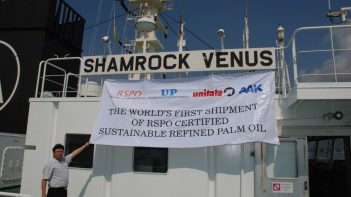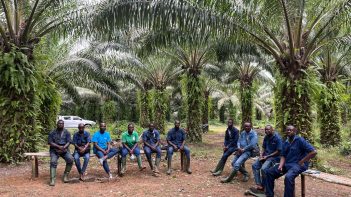In order to facilitate the implementation of new elements introduced in Principle 7 of the RSPO P&C 2013, and at the recommendation of the ERWG, the RSPO Board of Governors has approved the implementation date of 1st August 2014 for compliance to these new elements. This effectively means that:
- New planting procedure (NPP) submissions after 1st August 2014 shall include the requirements of Criterion 7.8 of the RSPO P&C 2013. The compliance to Criterion 7.8 is optional for NPPs submitted on or before 1st August 2014.
- For NPPs submitted between 1st May 2013 and 1st August 2014, the inclusion of a Land Use Change (LUC) analysis (see Indicator 7.3.2) in the HCV assessment is optional. However, a LUC analysis must be submitted for the aforementioned NPP areas by the time of the final certification audit where the optional LUC analysis has been carried out. For NPPs submitted after 1st August 2014 a LUC analysis must be included in the HCV assessment. Additionally, as per the staged implementation requirements of the RSPO Remediation and Compensation Procedures, a LUC analysis must be submitted for any area cleared since 2005 without prior HCV assessment by the end of September 2014.
Public reporting on C7.8 remains voluntary until 31st December 2016 when the implementation period ends. Therefore reporting on C7.8 will be as an annex to the standard NPP report. The annex will not be uploaded on to the RSPO website. However reporting to the Emission Reduction Working Group (ERWG) is required via the RSPO Secretariat. The only publicly available statement in the NPP, related to 7.8, would be a statement by a certification body confirming that the appropriate assessments have been made in compliance to 7.8 and that these assessments have been submitted to the ERWG. Public reporting is required from 1st January 2017. Please refer to Figure 1 for the process flow on the inclusion of Criterion 7.8.
There may be situations where extenuating circumstances do not allow for the inclusion of C7.8 as part of the NPP submission by the deadline stipulated. RSPO could accept proposals to incorporate C7.8 submission at a later date provided that there is a challenging time bound plan to meet this requirement. However, this flexibility will cease from 1st Jan 2015.
Process and Action Steps for Inclusion of Criterion 7.8 into the RSPO NPP submission
As recommended by the Emissions Reduction Working Group, requirements listed in Table 1 serves as a mandatory add-on to the current RSPO NPP submission. It accommodates the new requirements of Criterion 7.8 which was introduced in the RSPO P&C 2013. Submission of the requirements under Criterion 7.8 becomes mandatory after 1st August 2014.
Public reporting of the requirements under Criterion 7.8 remains voluntary until 31st December 2016. During this time, requirements under Criterion 7.8 will be reported to the RSPO as an annex to the standard NPP report. It will not be uploaded onto the RSPO website. However, as required under the RSPO P&C, it will be made available to the Emission Reduction Working Group. As of 1st January 2017, when public reporting becomes mandatory, requirements under Criterion 7.8 will be published together with the standard NPP report.
Table 1: Detailed Process and Action Steps for Inclusion of Criterion 7.8 in to the RSPO NPP submissions
1. Impact assessments
| Activities | Detailed action steps | Notes |
| Conduct a carbon assessment to identify and estimate all carbon stocks in the proposed development area; and Conduct a GHG emissions assessment to identify and estimate the major potential sources and sinks of emissions in the development area. (see RSPO criterion 7.8) | Company appoints competent assessors Carbon assessment follows the RSPO carbon assessment tool.
Others tools and methodologies can be used. The RSPO PalmGHG tool or an RSPO-endorsed equivalent will be used to estimate future GHG emissions from the new development using information from the carbon assessment If alternative tools are used the company will have to demonstrate equivalence to the RSPO. |
Procedure is only applicable to new plantings where the NPP is submitted to RSPO after 1st Aug 2014 |
2. Plan to minimise net GHG emissions
| Activities | Detailed action steps |
Results of Soil, Carbon and GHG assessments are incorporated into planning and management for the new plantings and related development that:
|
Based on the carbon assessment and net GHG emissions assessments results, develop a plan that minimises the net GHG emissions of the development and which includes at least the following:
Use the RSPO PalmGHG tool or an RSPO endorsed equivalent to estimate the impacts of the above management measures on the net GHG emissions of the development Prior to 31st December 2016: Company refers to the ERWG via the RSPO Secretariat to pilot processes and methods to develop the management and mitigation plan |
3. Verification
| Activities | Detailed action steps |
| Obtain written verification from an accredited RSPO certification body that the assessment process and the content of the plan are comprehensive, of professional quality and in compliance with relevant RSPO principles, criteria and indicators. The grower has the option of seeking such verification based on either a documentation audit by the certification body, or a field audit by the certification body. | Statement of verification should be included in the main NPP public report. While the assessment report and results are not made public. The NPP report should indicate that the carbon assessment, GHG assessment and GHG minimisation plans were conducted and completed. |
Reporting
| Activities | Detailed action steps | Notes |
| Submit copies of the carbon and GHG assessments, the emissions minimisation plan and the CB verification documentation to the RSPO along with the NPP documentation. | Prior to 31st December 2016: Company refers to the “Carbon Assessment Tool for New Oil Palm Plantings Report – Version June 2014”* and submits proposed carbon assessment methodology to the ERWG via the RSPO Secretariat for review and endorsement Assessments are carried out and reported to the ERWG. Format for reporting to the RSPO is indicated in the “Carbon Assessment Tool for New Oil Palm Plantings Report – Version June 2014”* | Prior to 31st December 2016, carbon and GHG assessments can be submitted in confidence to the RSPO. However it is desirable that they are also made public. Format for reporting to the RSPO is indicated in the “Carbon Assessment Tool for New Oil Palm Plantings Report – Version June 2014”* |
*The “Carbon Assessment Tool for New Oil Palm Plantings Report” will undergo periodic review by the ERWG during the implementation phase which ends on 31st December 2016. Companies and certification bodies should always refer to the RSPO website for the latest version of the report.
Keep reading

Nearly two decades on, Europe continues to drive global demand for RSPO Certified Palm Oil

Communicating Sustainable Palm Oil - examples of success across Europe
[EOT] Terms of Reference: Independent Smallholders Outreach Programme in Indonesia

RT2023 Delegates Propose Solutions to Reinforce RSPO’s Assurance System – End-Year Highlights of Assurance Standing Committee
RSPO UK Members' Day Examines Shifting Dynamics of Doing Business within Europe

Celebrating 20 Years of RSPO’s Sustainability Journey

Circular Economy and Biomass: A Game-Changer for the Sustainable Palm Oil Industry
Uptake Targets for Shared Responsibility for 2024 (Year 5) and Shared Responsibility Verification Manual




